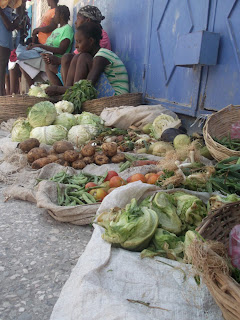 ye mwa sa yo, nou wè ke biznis nan zòn Christ Roi kòmanse ap boujonnen ankò e vinn gen plis restoran. Nou te sòti poun tal pale ak youn nan mèt resto sa yo, pou n te mandel plis enfomasyon sou kijan biznis pal la ye pou li.
ye mwa sa yo, nou wè ke biznis nan zòn Christ Roi kòmanse ap boujonnen ankò e vinn gen plis restoran. Nou te sòti poun tal pale ak youn nan mèt resto sa yo, pou n te mandel plis enfomasyon sou kijan biznis pal la ye pou li.Nou te arive poze l kesyon pou ki rezon li chwazi fè pal la nan zòn nan. Li te reponn nou se paske li wè zòn lan apropriye paske gen anpil moun ki frekante l. Li di li vle ede kominote a, tankou lontan yo te konn sòti ale byen lwen pou yo te ale achte yon pla cho, kounye a nou ka di pa gen sa ankò. Li te fè nou konnen dapre li biznis lan te trè rantab nan zòn lan, men kounye a la bagay yo chanje. Lè yo te fèk komanse, yo te konn depanse mwens kounye la yo ka di yo depanse plis pou yo prepare manje yo a koz de pri prodwi yo ki monte. Li di tou avan te gen plis kliyan men vi jan sitiyasyon ekonomik kounye a, moun yo pa sòti menm jan ankò.
Nou te gen privilèj pou n te pale ak youn nan kliyan yo tou ki di nou rezon ki fè li chwazi restoran sa se paske li jwenn bon akèy, sevis la rapid, e genyen bon kondisyon ijiène. Li te di pou mèt resto a pa dekouraje malgre jan sitiasyon ekonomik lan ye pou li toujou kenbe menm sèvis lan pou li ka jwenn plis kliyan.

Nou wè biznis sa yo bon pou kominote a paske moun yo jwenn bagay yo pi pwòch e pi fasil epi plis aktivite ekonomik nan zòn nan ka bon pou sekirite a tou paske depi genyen resto, konn gen plis limyè ak plis moun nan lari aswè. Nou swete pou mèt biznis sa yo jwenn plis kliyan e pou li rantrab pou yo, pou pemèt zòn lan kontinye devlope.
...........................................
Over the past few months, we have seen businesses starting to come back to life in Christ Roi and there are more and more restaurants in the area. We went out to talk with one of the restaurant owners in the area to see how business was going for him.
When asked was why he had chosen to start up his restaurant in this neighborhood, he explained that he had seen the area prime for this type of business because there was so much foot traffic. He saw opening up a restaurant as a way to help out the local community too, as people used to have to walk pretty far to get a hot meal. Now, that’s not the case anymore.
We had the chance to speak with one of the restaurant customers as well and asked why he had chosen this spot. He said the staff is always friendly, the service is fast and they are always clean. He hoped that despite the economy that the restaurant continues to deliver good service so they can attract more customers.
From our point of view, we see these businesses are good for the community - people in the area have access to more things close by and more economic activity can help the security situation too. When there are restaurants open, there tends to be more lighting and more people out on the streets in the evenings. We hope these business owners are able to find more customers and and that business to be profitable so that the area continues to develop.






